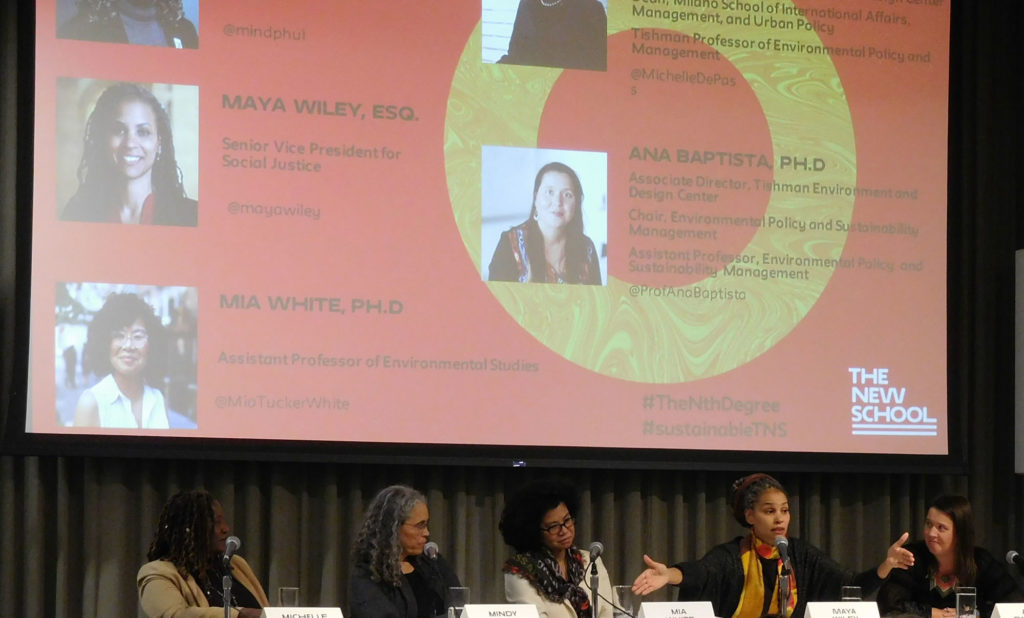
New School Faculty Members Confront Environmental Injustices
In 1991, 300 activists gathered at the First National People of Color Environmental Leadership Summit in Washington, DC, with the goal of redefining environmental issues to reflect social, racial, and economic justice concerns.
The summit produced the 17 Principles of Environmental Justice, a document that called for a movement “to eradicate environmental racism and bring into being true social justice and self-determination.” To this day, the document continues to guide the national discourse about environmental justice.
Twenty-five years later, a group of modern-day leaders — New School faculty members who are women of color — gathered to celebrate the anniversary of the summit and explore the ways in which academia can fuel the movement from which it emerged.
The event, Environmental Justice: Then and Now, was moderated by Michelle DePass, dean of the Milano School of International Affairs, Management, and Urban Policy and director of the Tishman Environment and Design Center, and featured Ana Baptista, assistant professor of environmental policy and management and associate director of the Tishman Center, and new faculty members Mindy Fullilove, professor of urban policy and health; Mia White, assistant professor of environmental studies and assistant professor of environmental policy and management; and Maya Wiley, senior vice president for Social Justice and the Henry Cohen Professor of Urban Policy and Management.
“Our communities are constructed by a series of policies that, while invisible, have an enormous impact,” Wiley said in her opening remarks. “Seventy-five percent of black Americans live within 30 miles of a power plant; people think of this as a poverty problem and not a race problem. That’s where the impact of those invisible policies is felt deepest.”
During the event, which was hosted by the Tishman Environment and Design Center, each panelist brought her unique experience and expertise to bear in confronting institutional racism and structural injustice embedded in environmental policy.
“All 50 states have environmental justice policies, but the majority of them are symbolic and only recognize the problems rather than address them,” Baptista said. “By enacting policies that stay within the environment, we are missing the chance to tie environmental success in with the economy, transportation, and other important issues that will result in transformative change.”
The speakers highlighted issues that are often ignored by the public, from the health impacts of racially motivated environmental policies to the trauma experienced by communities as a result of gentrification. Fullilove touched on the issue of toxic substances that have affected communities in Harlem for decades; it was only when wealthier residents began moving in, she said, that they were cleaned up.
“Segregation has become hidden, but the effects of gentrification aren’t,” she said. “We need healthy communities to create a sustainable future.”
The panelists also discussed their own efforts to tackle environmental issues affecting communities of color. During her time as a counsel to Mayor Bill de Blasio, Wiley helped bring broadband access to low-income communities to spur environmental innovation; White worked with a Mississippi community to save a sacred creek that had been polluted; and Baptista has fought polluting industries like garbage incinerators in her hometown of Newark, New Jersey.
Reflecting her dedication to social engagement, Wiley spoke of her belief in the power of educational institutions to advance social justice causes.
“At a place like The New School, we have this opportunity to think about how we govern,” Wiley said. “By educating our students about these issues, we can help create change.”
“We have to see ourselves as part of a collective,” Baptista added. “The action is at the front lines, and I want to encourage students to connect with that action.”
Underscoring the lack of attention of attention given to environmental justice issues, DePass said that during the presidential debates, the environment was discussed for only five minutes and 27 seconds. To confront the status quo, the panelists urged the New School community to keep alive the fight started by the First National People of Color Environmental Leadership Summit.
“I hope more of you tap into your revolutionary impulse,” said White. “Would you be willing to get in trouble for it? How are each of you going to imagine a new way to live?”